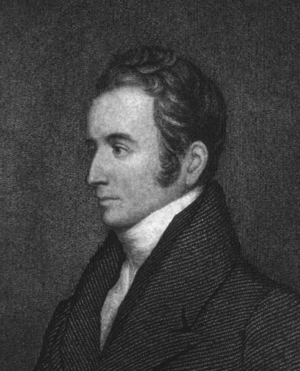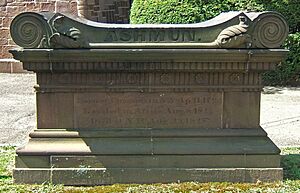Jehudi Ashmun facts for kids
Quick facts for kids
Jehudi Ashmun
|
|
|---|---|

Portrait ca. 1825
|
|
| 4th and 6th Colonial Agent of Liberia | |
| In office 8 August 1822 – 2 April 1824 |
|
| Preceded by | Elijah Johnson |
| Succeeded by | Elijah Johnson |
| In office 14 August 1824 – 26 March 1828 |
|
| Preceded by | Elijah Johnson |
| Succeeded by | Lott Cary |
| Personal details | |
| Born | 21 April 1794 Champlain, New York, U.S. |
| Died | 25 August 1828 (aged 34) New Haven, Connecticut, U.S. |
| Nationality | American |
Jehudi Ashmun (born April 21, 1794 – died August 25, 1828) was an American religious leader. He was also a social reformer from New England. Ashmun became involved with the American Colonization Society (ACS). This group helped create the colony of Liberia in West Africa. Liberia was a place for free people of color from the United States to settle.
Ashmun moved to Monrovia, Liberia, in 1822. There, he worked as the United States government's agent. This role was like being the governor. He served two terms: from August 1822 to April 1824, and from August 1824 to March 1828. Ashmun became very sick and returned to the United States. He passed away later that same year.
Contents
Early Life and Education of Jehudi Ashmun
Jehudi Ashmun was born in 1794 in Champlain, New York. He first studied at Middlebury College in Vermont. During his last year of college, he attended the University of Vermont. After finishing his studies, he became a minister in Maine.
Ashmun's Career and Work in Liberia
Ashmun was chosen as the first principal of the Bangor Theological Seminary in Bangor, Maine. He also became one of its first two professors. He kept this teaching job until 1827. This was even though he lived and worked in the new colony of Monrovia, Liberia, for a few years.
Working with the American Colonization Society
Ashmun later moved back to the United States. He settled in Washington, D.C. There, he worked as an editor for an Episcopalian magazine. He became very interested in the work of the American Colonization Society (ACS). This group wanted to help free Black Americans move to a new colony in West Africa. Ashmun started a newspaper called The African Intelligencer to write about the ACS's goals.
His articles about the ACS led to a special job for Ashmun. He was appointed as the U.S. government's representative to the new colony. Even though private groups paid for the project, the U.S. Congress supported it. In 1822, when he was 26, Ashmun led a group of settlers and missionaries to Liberia. They traveled on a ship called the Elizabeth. His wife went with him. Sadly, she was one of many settlers who died from diseases like malaria in the new settlement.
Leading the Colony of Liberia
As the U.S. representative and ACS agent, Ashmun was like the governor of the Liberia colony. He served from 1822 to 1828, when he was between 28 and 34 years old. He found the colony to be struggling and took on a strong leadership role.
He helped build defenses for Monrovia. These defenses protected the settlers from attacks by local tribes and slave traders. Ashmun also worked to grow trade between the colony and the U.S., Great Britain, and Europe. During his time in Liberia, he helped increase farming. He also added more land from nearby tribes and found new business chances.
Ashmun helped create a constitution for Liberia. This document allowed African Americans to hold government positions. For many years, African Americans and their descendants, known as Americo-Liberians, were in charge of the government. This continued into the late 1900s.
In contrast, the nearby British colony of Sierra Leone was mostly led by white people in its early years. Freetown, its main city, was first created for free Black people from Britain and Canada. Many of these were Black Loyalists. They were formerly enslaved African Americans who gained freedom by joining the British during the American Revolutionary War.
Ashmun wrote many letters to ACS officials, family, and friends in the United States. He also wrote a book called History of the American Colony in Liberia, 1821–1823 (1826). These writings are some of the earliest records of the Liberia colony's history.
Death of Jehudi Ashmun
Ashmun became very ill while in Liberia. He returned to the United States in 1828. He died soon after in New Haven, Connecticut. He was buried there in Grove Street Cemetery.
Legacy and Honors for Ashmun
- Lincoln University in Pennsylvania is a historically black college. It was first named Ashmun Institute in 1854 to honor him.
See also
 In Spanish: Jehudi Ashmun para niños
In Spanish: Jehudi Ashmun para niños
 | Kyle Baker |
 | Joseph Yoakum |
 | Laura Wheeler Waring |
 | Henry Ossawa Tanner |


